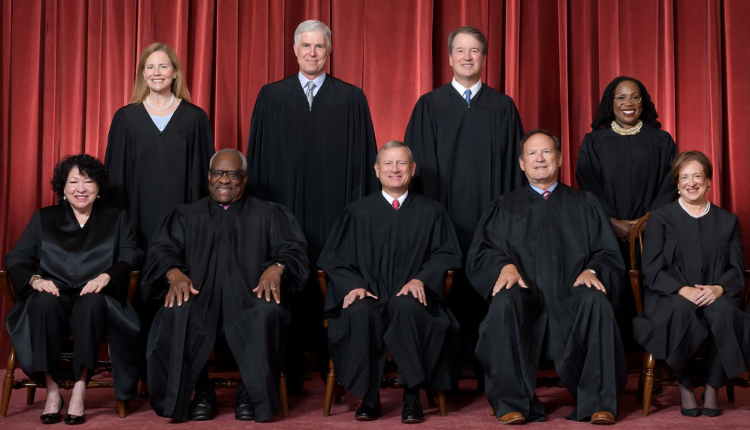Want to be a Supreme Court clerk? It helps to graduate from these law schools and colleges

The U.S. Supreme Court as composed June 30, 2022, to present. Photo by Fred Schilling via the Supreme Court website.
More than two-thirds of law clerks for U.S. Supreme Court justices come from just five law schools, according to a study covering the period between 1980 and 2020.
Those law schools are Harvard University, Yale University, Stanford University, Columbia University and the University of Chicago, the New York Times reported last week. And the study found that some college degrees also count.
“You might think that doing well at one of those law schools and then obtaining a prestigious clerkship with a federal appeals court judge would check the necessary boxes,” the New York Times reports. “But it turns out that undergraduate degrees seem to matter too. Going to college at Harvard, Yale or Princeton—even after controlling for law school grades—gave applicants a significant boost, the study found.”
The study looked at the backgrounds of 1,426 former Supreme Court law clerks. It was conducted by Albert H. Yoon, a professor at the University of Toronto Faculty of Law; Tracey E. George, a professor at the Vanderbilt University Law School; and Mitu Gulati, a professor at the University of Virginia School of Law.
The Balls and Strikes blog also covered the study.
The blog and the New York Times noted that Supreme Court justices also have elite degrees. Four justices have law degrees from Yale Law School and four from Harvard Law School. Justice Amy Coney Barrett is the exception, who has a law degree from the University of Notre Dame Law School.
Six justices have undergraduate degrees from Harvard, Yale or Princeton. The exceptions are Justice Clarence Thomas, a graduate of the College of the Holy Cross; Justice Neil Gorsuch, a graduate of Columbia University; and Barrett, a graduate of Rhodes College, according to their online biographies, a Business Insider article and a 2020 Rhodes College press release.
Every lawyer in the running for a Supreme Court clerkship “has ticked all the boxes,” according to the study. They are a “selective law school, top grades, law review membership, glowing references from law faculty. After graduation, they have clerked for one of the 179 active U.S. Court of Appeals judges, preferably one who has a reputation for sending clerks to the court.”
About 700 law grads per year meet these qualifications. But only 36 secure a Supreme Court clerkship.
“We find that educational pedigree, as opposed to academic performance or any other qualification, often distinguishes the winners from the also-rans. The court clerkship selection process, like other elite labor markets, proves to be a blend of status and merit where status often prevails,” the study authors wrote.
Hat tip to How Appealing.



